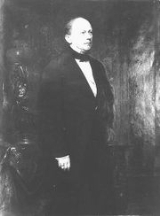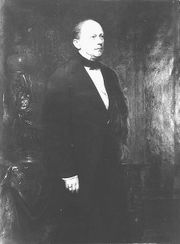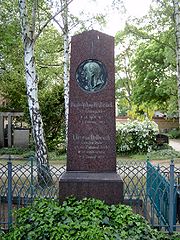
Rudolf von Delbrück
Encyclopedia


Kingdom of Prussia
The Kingdom of Prussia was a German kingdom from 1701 to 1918. Until the defeat of Germany in World War I, it comprised almost two-thirds of the area of the German Empire...
statesman
Statesman
A statesman is usually a politician or other notable public figure who has had a long and respected career in politics or government at the national and international level. As a term of respect, it is usually left to supporters or commentators to use the term...
at the time of Otto von Bismarck
Otto von Bismarck
Otto Eduard Leopold, Prince of Bismarck, Duke of Lauenburg , simply known as Otto von Bismarck, was a Prussian-German statesman whose actions unified Germany, made it a major player in world affairs, and created a balance of power that kept Europe at peace after 1871.As Minister President of...
.
Biography
Delbrück was born at BerlinBerlin
Berlin is the capital city of Germany and is one of the 16 states of Germany. With a population of 3.45 million people, Berlin is Germany's largest city. It is the second most populous city proper and the seventh most populous urban area in the European Union...
, Province of Brandenburg
Province of Brandenburg
The Province of Brandenburg was a province of the Kingdom of Prussia and the Free State of Prussia from 1815 to 1946.-History:The first people who are known to have inhabited Brandenburg were the Suevi. They were succeeded by the Slavonians, whom Henry II conquered and converted to Christianity in...
. He came of a distinguished family, his father, Johann Friedrich Gottlieb Delbrück (d. 1830), having been preceptor of the two Prussian princes afterwards known as King Frederick William IV
Frederick William IV of Prussia
|align=right|Upon his accession, he toned down the reactionary policies enacted by his father, easing press censorship and promising to enact a constitution at some point, but he refused to enact a popular legislative assembly, preferring to work with the aristocracy through "united committees" of...
and Emperor William I. Rudolf von Delbrück studied in Halle, Bonn, and Berlin. On completing his legal studies, he entered the service of the state in 1837; and after holding a series of minor posts was transferred in 1848 to the ministry of commerce, which was to be the sphere of his real life's work.
The states of the German Confederation
German Confederation
The German Confederation was the loose association of Central European states created by the Congress of Vienna in 1815 to coordinate the economies of separate German-speaking countries. It acted as a buffer between the powerful states of Austria and Prussia...
, including Prussia and the Austrian Empire
Austrian Empire
The Austrian Empire was a modern era successor empire, which was centered on what is today's Austria and which officially lasted from 1804 to 1867. It was followed by the Empire of Austria-Hungary, whose proclamation was a diplomatic move that elevated Hungary's status within the Austrian Empire...
, had realized the influence of commercial upon political union. Delbrück in 1851 induced Hanover
Kingdom of Hanover
The Kingdom of Hanover was established in October 1814 by the Congress of Vienna, with the restoration of George III to his Hanoverian territories after the Napoleonic era. It succeeded the former Electorate of Brunswick-Lüneburg , and joined with 38 other sovereign states in the German...
, Oldenburg, and Schaumburg-Lippe
Schaumburg-Lippe
Schaumburg-Lippe was until 1946 a small state in Germany, located in the present day state of Lower Saxony, with its capital at Bückeburg.- History :...
to join the Zollverein
Zollverein
thumb|upright=1.2|The German Zollverein 1834–1919blue = Prussia in 1834 grey= Included region until 1866yellow= Excluded after 1866red = Borders of the German Union of 1828 pink= Relevant others until 1834...
; and the southern states, which had agreed to admit Austria to the union, found themselves forced in 1853 to renew the old union, from which Austria was excluded. Delbrück now began, with the support of Otto von Bismarck
Otto von Bismarck
Otto Eduard Leopold, Prince of Bismarck, Duke of Lauenburg , simply known as Otto von Bismarck, was a Prussian-German statesman whose actions unified Germany, made it a major player in world affairs, and created a balance of power that kept Europe at peace after 1871.As Minister President of...
, to apply the principles of free trade to Prussian fiscal policy.
In 1862 Delbrück concluded an important commercial treaty with France
France
The French Republic , The French Republic , The French Republic , (commonly known as France , is a unitary semi-presidential republic in Western Europe with several overseas territories and islands located on other continents and in the Indian, Pacific, and Atlantic oceans. Metropolitan France...
. In 1867 he became the first president of the chancery of the North German Confederation
North German Confederation
The North German Confederation 1866–71, was a federation of 22 independent states of northern Germany. It was formed by a constitution accepted by the member states in 1867 and controlled military and foreign policy. It included the new Reichstag, a parliament elected by universal manhood...
, and represented Bismarck on the federal tariff council (Zollbundesrath), a position of political as well as fiscal importance owing to the presence in the council of representatives of the southern states. In. 1868 he became a Prussian minister without portfolio. In October 1870, when the union of Germany under Prussian headship became a practical question, Delbrück was chosen to go on a mission to the South German states, and contributed greatly to the agreements concluded at Versailles
Versailles
Versailles , a city renowned for its château, the Palace of Versailles, was the de facto capital of the kingdom of France for over a century, from 1682 to 1789. It is now a wealthy suburb of Paris and remains an important administrative and judicial centre...
in November.
In 1871 Delbrück became president of the newly constituted Reichskanzleramt. Delbrück, however, began to feel himself uneasy under Bismarck's leanings towards protection and state control. On the introduction of Bismarck's plan for the acquisition of the railways by the state, Delbrück resigned office, nominally on the ground of ill-health (June 1, 1876). In 1879 he opposed in the Reichstag
Reichstag (German Empire)
The Reichstag was the parliament of the North German Confederation , and of the German Reich ....
the new protectionist tariff, and on the failure of his efforts retired definitely from public life in 1881. In 1896 he received from William II
William II, German Emperor
Wilhelm II was the last German Emperor and King of Prussia, ruling the German Empire and the Kingdom of Prussia from 15 June 1888 to 9 November 1918. He was a grandson of the British Queen Victoria and related to many monarchs and princes of Europe...
the Order of the Black Eagle
Order of the Black Eagle
The Order of the Black Eagle was the highest order of chivalry in the Kingdom of Prussia. The order was founded on 17 January 1701 by Elector Friedrich III of Brandenburg . In his Dutch exile after WWI, deposed Emperor Wilhelm II continued to award the order to his family...
. He died at Berlin.

